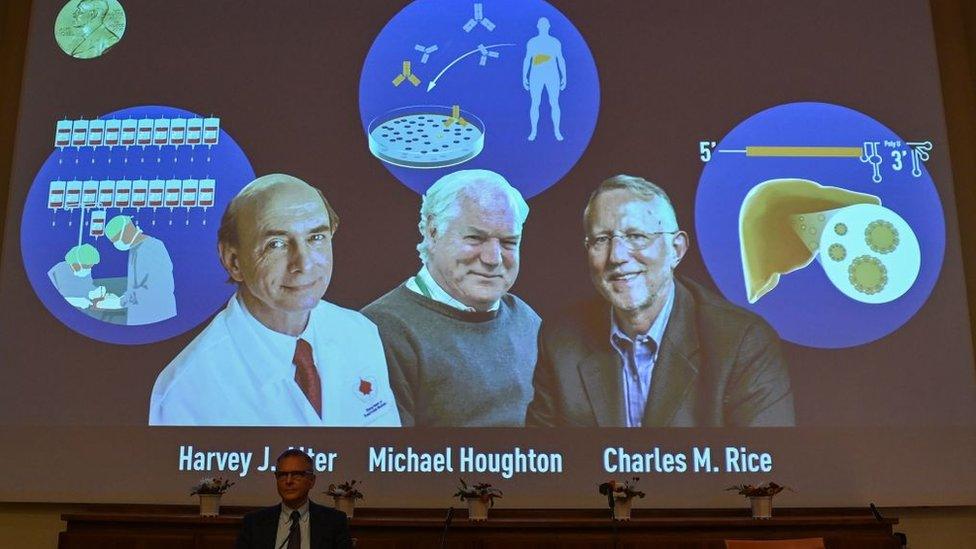Nobel Prize for Medicine goes to Hepatitis C discovery
- Published

The announcement was made at a press conference at the Karolinska Institute in Stockholm, Sweden
Three scientists who discovered the virus Hepatitis C have won the 2020 Nobel Prize in Medicine or Physiology.
The winners are British scientist Michael Houghton and US researchers Harvey Alter and Charles Rice.
The Nobel Prize committee said their discoveries ultimately "saved millions of lives".
The virus is a common cause of liver cancer and a major reason why people need a liver transplant.
In the 1960s, there was huge concern that people receiving donated blood were getting chronic hepatitis (liver inflammation) from an unknown, mysterious disease.
The Nobel Prize committee said a blood transfusion at the time was like "Russian roulette".
Highly sensitive blood tests mean such cases have now been eliminated in many parts of the world, and effective anti-viral drugs have also been developed.
"For the first time in history, the disease can now be cured, raising hopes of eradicating Hepatitis C virus from the world," the prize committee said.
However, there are 70 million people currently living with the virus, which still kills around 400,000 a year.
The mystery killer
The viruses Hepatitis A and Hepatitis B had been discovered by the mid-1960s.
But Prof Harvey Alter, while studying transfusion patients at the US National Institutes of Health in 1972, showed there was another, mystery, infection at work, external.
Patients were still getting sick after receiving donated blood.
He showed that giving blood from infected patients to chimpanzees led to them developing the disease.
The mysterious illness became known as "non-A, non-B" hepatitis and the hunt was now on.
Prof Michael Houghton, while at the pharmaceutical firm Chiron, managed to isolated the genetic sequence of the virus in 1989, external. This showed it was a type of flavivirus and it was named Hepatitis C.
And Prof Charles Rice, while at Washington University in St. Louis, applied the finishing touches in 1997, external. He injected a genetically engineered Hepatitis C virus into the liver of chimpanzees and showed this could lead to hepatitis.
Prof Houghton, now at the University of Alberta in Canada, told the BBC: "We had limited tools available to us then, so it was rather like searching for a needle in a haystack.
"The amount of virus present in the liver and the blood was very low, and the sensitivity of our techniques was not high enough, so we were sailing very close to the wind all the time.
"We tried a lot of methods, probably 30 or 40 different methodological approaches over seven years, and eventually one worked."
Commenting on the announcement, Dr Claire Bayntun, a clinical consultant in global public health and vice-president of Royal Society of Medicine, said the discovery was an "extraordinary achievement".
She said: "[In] unlocking the door to the development of effective treatment and screening of blood transfusions, and protecting populations in many regions of the world, millions of lives have been saved."
Follow James on Twitter, external

Previous winners
2019 - Sir Peter Ratcliffe, William Kaelin and Gregg Semenza for discovered how cells sense and adapt to oxygen levels
2018 - James P Allison and Tasuku Honjo for discovering how to fight cancer using the body's immune system
2017- Jeffrey Hall, Michael Rosbash and Michael Young for unravelling how bodies keep a circadian rhythm or body clock
2016 - Yoshinori Ohsumi for discovering how cells remain healthy by recycling waste
2015 - William C Campbell, Satoshi Ōmura and Youyou Tu for anti-parasite drug discoveries
2014 - John O'Keefe, May-Britt Moser and Edvard Moser for discovering the brain's navigating system